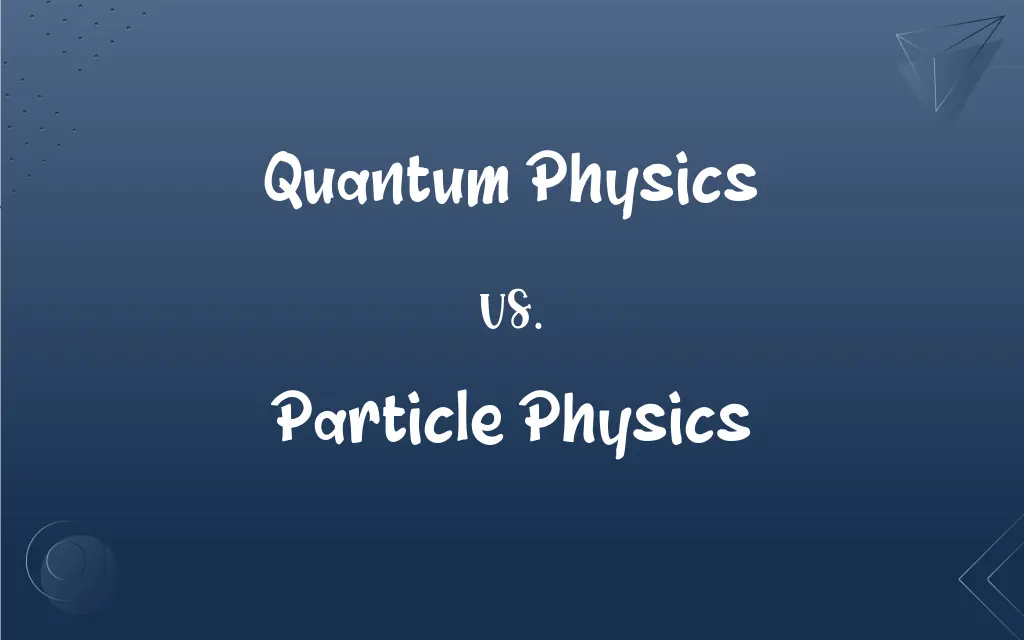Quantum Physics vs. Particle Physics: What's the Difference?
Edited by Aimie Carlson || By Janet White || Published on December 14, 2023
Quantum physics studies the behavior of matter and energy at the smallest scales, while particle physics focuses on the fundamental particles and forces of the universe.

Key Differences
Quantum physics explores the peculiar behaviors of subatomic particles, focusing on phenomena like wave-particle duality and quantum entanglement. While, particle physics delves into the fundamental constituents of matter, such as quarks and leptons, and the forces governing them.
Quantum physics underpins the principles of superposition and uncertainty, fundamentally altering our understanding of reality. Particle physics, meanwhile, seeks to unify the understanding of the four fundamental forces of nature: gravity, electromagnetism, the strong force, and the weak force.
Quantum physics has led to revolutionary technologies like quantum computing and MRI machines. However, particle physics has contributed to advances in medical imaging and the World Wide Web, originally developed at CERN.
The theoretical framework of quantum physics includes quantum field theory, which also plays a crucial role in particle physics. Whereas, particle physics, particularly through the use of particle accelerators, tests theories of quantum mechanics on a practical level.
Quantum physics often deals with probabilities and non-intuitive phenomena at the atomic and subatomic level. Particle physics involves the experimental study of particles like protons, neutrons, and electrons, and exotic particles like neutrinos and bosons.
ADVERTISEMENT
Comparison Chart
Focus
Behavior of matter and energy at tiny scales
Fundamental particles and forces
Key Concepts
Wave-particle duality, entanglement
Quarks, leptons, fundamental forces
Practical Applications
Quantum computing, MRI machines
Medical imaging, World Wide Web
Theoretical Framework
Quantum mechanics, quantum field theory
Standard Model, force unification theories
Experimental Approaches
Probability, non-intuitive phenomena
Particle accelerators, experimental testing
ADVERTISEMENT
Quantum Physics and Particle Physics Definitions
Quantum Physics
Quantum physics is the study of the behavior of matter and energy at the quantum level.
Quantum physics explains why electrons can exist in multiple states simultaneously.
Particle Physics
Particle physics explores the Standard Model, which explains elementary particles and interactions.
The discovery of the Higgs boson was a significant achievement in particle physics.
Quantum Physics
Quantum physics underlies modern technologies like semiconductors and lasers.
The principles of quantum physics are essential for the functioning of lasers.
Particle Physics
Particle physics uses accelerators like the Large Hadron Collider to study particles.
Collisions in particle accelerators allow physicists to observe rare particles.
Quantum Physics
Quantum physics encompasses principles like superposition and entanglement.
Quantum entanglement allows particles to be interconnected regardless of distance.
Particle Physics
Particle physics contributes to advancements in technology and medicine.
Techniques developed in particle physics are used in PET scans in medical diagnostics.
Quantum Physics
Quantum physics challenges classical notions of physics with its probabilistic nature.
In quantum physics, the exact position of a particle cannot be determined with certainty.
Particle Physics
Particle physics studies the fundamental particles and the forces that govern them.
Particle physics investigates how quarks combine to form protons and neutrons.
Quantum Physics
Quantum physics includes theories like quantum mechanics and quantum field theory.
Quantum field theory combines classical field theory with quantum mechanics.
Particle Physics
Particle physics aims to unify the fundamental forces of nature under one theory.
Research in particle physics seeks to explain how gravity fits into the Standard Model.
FAQs
What are some discoveries in particle physics?
Discoveries like the Higgs boson and quarks are milestones in particle physics.
What is quantum physics?
Quantum physics is the study of matter and energy at the smallest, quantum level.
What is particle physics?
Particle physics focuses on the fundamental particles of the universe and the forces that govern them.
What technologies have emerged from quantum physics?
Quantum computing, MRI machines, and lasers have roots in quantum physics.
How do quantum physics and particle physics intersect?
Quantum field theory, a part of quantum physics, is fundamental to the understanding of particle physics.
What's the Standard Model in particle physics?
The Standard Model is a theory in particle physics that describes three of the four known fundamental forces.
How does quantum physics affect our understanding of reality?
Quantum physics introduces concepts like entanglement and superposition, challenging classical views of reality.
Are there unsolved problems in quantum physics?
Yes, including the reconciliation of quantum mechanics with general relativity.
How does a particle accelerator work?
Particle accelerators speed up particles and collide them, allowing study of the resulting interactions.
Can quantum physics explain everything?
No, it has limitations, especially regarding macroscopic objects and gravitational forces.
What's the importance of the Higgs boson?
The Higgs boson is key to understanding why particles have mass, a major question in particle physics.
Can quantum physics describe gravity?
Quantum physics struggles with incorporating gravity, which is more the domain of general relativity.
What are quarks and leptons?
Quarks and leptons are types of elementary particles studied in particle physics.
How do quantum physics principles impact daily life?
Technologies like smartphones and computers rely on principles of quantum physics.
How does particle physics impact cosmology?
Particle physics helps explain the fundamental aspects of the universe, aiding in cosmological studies.
What's the goal of particle physics?
To understand the fundamental particles and forces of the universe and possibly find a unified theory.
Is dark matter related to particle physics?
Yes, particle physics research aims to understand dark matter, a mysterious component of the universe.
What's the significance of superposition in quantum physics?
Superposition allows particles to exist in multiple states simultaneously, a core concept in quantum physics.
What's the role of probability in quantum physics?
Quantum physics often deals with probabilities rather than certainties, especially in particle behavior.
Can quantum physics lead to new energy sources?
Research in quantum physics could potentially lead to new, more efficient energy sources.
About Author
Written by
Janet WhiteJanet White has been an esteemed writer and blogger for Difference Wiki. Holding a Master's degree in Science and Medical Journalism from the prestigious Boston University, she has consistently demonstrated her expertise and passion for her field. When she's not immersed in her work, Janet relishes her time exercising, delving into a good book, and cherishing moments with friends and family.
Edited by
Aimie CarlsonAimie Carlson, holding a master's degree in English literature, is a fervent English language enthusiast. She lends her writing talents to Difference Wiki, a prominent website that specializes in comparisons, offering readers insightful analyses that both captivate and inform.































































